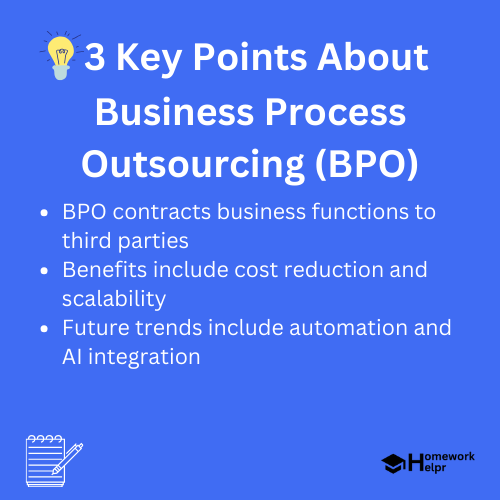📝 Summary
Business Process Outsourcing, or BPO, allows companies to contract specific business functions to third-party providers, enabling them to focus on their core expertise. BPO includes customer service, accounting, human resources, and IT support, having evolved from manufacturing to a global industry due to operational efficiency. It can be categorized into back-office and front-office outsourcing, each serving different organizational needs. The main advantages are cost reduction, improved service quality, access to expertise, and scalability. However, challenges such as quality control, communication barriers, and data security must be addressed. As technology advances, the future of BPO will likely incorporate automation, AI integration, and cloud solutions.
Understanding Business Process Outsourcing (BPO)
Business Process Outsourcing, commonly referred to as BPO, is a practice where companies contract specific business functions to third-party service providers. This allows organizations to focus on their key areas of expertise while outsourcing non-core activities. BPO can encompass a wide range of services, including customer service, accounting, human resources, and technical support.
The Evolution of BPO
The concept of BPO isn’t new; it has been around for several decades. Initially, it started in manufacturing, where companies began outsourcing production processes to reduce costs. Over time, it expanded into various sectors, significantly in information technology and service-oriented industries. Today, BPO has transformed into a global industry, with many organizations relying on outsourcing providers for efficiency and operational improvement.
Definition
- Outsourcing: The practice of obtaining goods or services from an outside supplier.
- Efficiency: The ability to accomplish a task with the least waste of time and effort.
Types of BPO
BPO can be categorized primarily into two types: back-office outsourcing and front-office outsourcing. Understanding these can help you grasp how organizations utilize these services effectively.
- Back-Office Outsourcing: This involves the internal business functions that support the front office, including data entry, accounting, payroll, and IT services.
- Front-Office Outsourcing: This includes customer-facing services such as telemarketing, customer support, and sales.
Companies often choose to outsource a combination of both to optimize their operations. For example, a company might handle its marketing in-house while outsourcing its customer support to improve service quality.
Example
For instance, a software company may outsource its technical support to a BPO firm that specializes in handling customer queries related to their product. This allows the software company to focus on developing new features and improving the software itself.
The Benefits of BPO
Outsourcing business processes can yield numerous benefits for organizations. Here are some main advantages:
- Cost Reduction: By outsourcing, companies can often save on operational costs, including salaries, benefits, and overhead.
- Focus on Core Activities: Companies can devote their time and resources to their main services or products without having to manage non-core activities.
- Access to Expertise: BPO providers often have highly specialized knowledge and skills, which can improve service quality and innovation.
- Scalability: Businesses can easily scale their operations up or down based on market demand without the hassle of hiring or laying off employees.
Many businesses gain a competitive edge by leveraging these benefits through BPO strategies while maintaining quality and service levels.
💡Did You Know?
Did you know that the United States was one of the first countries to adopt BPO on a significant scale? Companies began outsourcing customer service and tech support to countries like India in the 1990s, which kickstarted the modern BPO industry!
Challenges of BPO
Despite its benefits, BPO comes with its own set of challenges that companies must navigate. Some of these include:
- Quality Control: Maintaining the quality of outsourced services can sometimes be difficult, potentially impacting customer satisfaction.
- Communication Barriers: Differences in time zones, language, and cultural nuances may pose significant challenges.
- Data Security: Sharing sensitive information with third-party vendors raises concerns over data privacy and security.
Companies must establish strict guidelines and maintain open communication channels to mitigate these issues, ensuring the outsourced services align with their quality standards.
Example
For example, a company may face difficulties managing remote teams located in different time zones. This could delay project timelines if not properly coordinated and communicated.
Future Trends in BPO
The BPO industry is continuously evolving, driven by technological advancements and changing business needs. Some of the key trends expected to shape the future of BPO include:
- Automation: Implementation of robotic process automation (RPA) to manage repetitive tasks, thereby increasing speed and accuracy.
- AI Integration: Leveraging artificial intelligence for better customer service and support solutions.
- Cloud-Based Solutions: Utilizing cloud technology to enhance collaboration and accessibility of resources.
These elements will propel BPO services into new territories of efficiency and customer satisfaction, creating more opportunities for businesses worldwide.
Conclusion
In summary, Business Process Outsourcing (BPO) is a vital tool that organizations use to enhance operational efficiency, reduce costs, and focus on their journey towards greatness. By understanding the different types of BPO, benefits, challenges, and future trends, students can appreciate how this practice transforms industries. With the ongoing growth and evolution of technology, BPO will continue to present exciting opportunities for businesses and professionals alike.
As we move forward, the importance of adaptability in this ever-changing landscape will be crucial. Students thinking about a career in business should consider the skills required in the BPO industry, as this field is poised for future growth and innovation.

Related Questions on Business Process Outsourcing (BPO)
What is BPO?
Answer: BPO stands for Business Process Outsourcing, which involves contracting specific business functions to third-party service providers.
What are the types of BPO?
Answer: The two main types of BPO are back-office outsourcing (internal functions like accounting) and front-office outsourcing (customer-facing services like support).
What are the benefits of BPO?
Answer: Benefits of BPO include cost reduction, the ability to focus on core activities, access to specialized expertise, and operational scalability.
What challenges does BPO present?
Answer: Challenges include maintaining quality control, communication barriers, and concerns over data security when sharing sensitive information with vendors.
